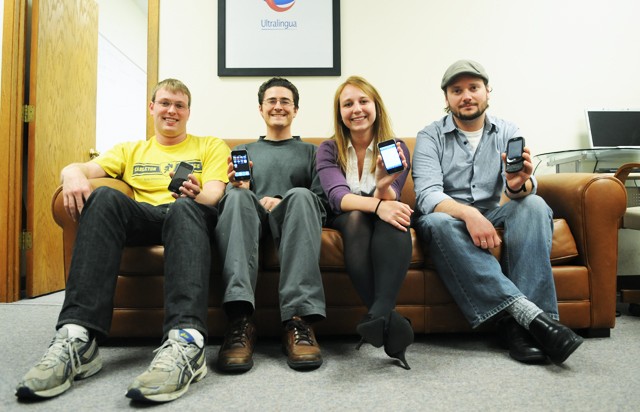With the birth of his son 15 years ago, dedicated linguist dâÄôArmond Speers embarked on the ultimate experiment: He spoke to him only in Klingon âÄî the language of the alien race of âÄúStar TrekâÄù fame âÄî for the first three years of his life. âÄúI was interested in the question of whether my son, going through his first language acquisition process, would acquire it like any human language,âÄù Speers said. âÄúHe was definitely starting to learn it.âÄù So when Ultralingua, a dictionary, translation and grammar software company in Dinkytown, honored requests from customers to create applications for a Klingon dictionary, they turned to Speers, a self-employed software consultant. âÄúIt was right square in my sweet spot,âÄù said Speers, who graduated from Georgetown University in 2002 with a doctorate in computational linguistics. Ultralingua, located in the University Technology Enterprise Center for the past seven years, specializes in developing software and Web-based language learning tools, including 16 different dictionaries and four grammar and spelling checkers. The company has grown rapidly over the past two years due to the success of its iPhone applications as well as its Mac and Windows software. Applications for mobile devices like Palm and Windows Mobile have also been successful, and partnerships with Blackberry and Android are in the works. The products are helpful for students learning foreign languages, because they are maintained by professional linguists and donâÄôt require an Internet connection, Ashleigh Lincoln, marketing generalist and recent University of Minnesota graduate, said. For her college Spanish courses, Lincoln said she used translation Web sites that didnâÄôt always give correct definitions. âÄúEvery student has stories about looking something up online, putting it in your paper and getting it wrong,âÄù she said, adding that while there are thousands of digital applications out there, most are unreliable. The companyâÄôs digital dictionaries include French-English, Spanish-English, Spanish-German, Italian-English and English-Portuguese, as well as several monolingual dictionaries. To create the dictionaries, Ultralingua purchases the rights to existing data sets, which its software engineers then combine with their software. Before a product is released, the software undergoes rigorous testing to check for bugs and to make sure it wonâÄôt crash and is user-friendly, Lincoln said. Ultralingua created their Klingon dictionary around the Simon & SchusterâÄôs data set and developed applications for the iPhone in May and for Mac and Windows computers over the summer. The software includes a conversational phrases component, featuring audio clips of Lt. Commander Worf, the Klingon from the âÄúStar TrekâÄù television series, âÄúThe Next Generation,âÄù speaking phrases such as âÄúAll of you are boringâÄù and âÄúIâÄôll have the black ale.âÄù âÄúThe group interested in that is small but loyal,âÄù Lincoln said. âÄúTheyâÄôre passionate about their language.âÄù Before the end of the year, the company plans to release its Mandarin-English dictionary applications, which will give users the option of either drawing the Chinese characters to be matched with the corresponding English word or typing the desired word into a specialized keyboard, general manager Loring Harrop said. UltralinguaâÄôs products attract a wide range of consumers, from students, linguists and translators to larger entities such as HarperCollins Publishers, the Peace Corps, the United Nations and the Canadian government. âÄúCommunication itself is a big part of the field that makes business go, makes any kind of relationship go,âÄù Harrop said. Partnerships with large businesses are in the works, including a laboratory that needs complex health care terms translated in multiple languages and a global insurance company that needs a consistent set of terminology across its locations. âÄúPoor communication slows businesses down; it makes them less efficient,âÄù Harrop said. âÄúSo itâÄôs a money matter.âÄù Ultralingua began in 1997 when a French linguist and a college professor created a French-English dictionary from scratch for students at Carleton College. The success of the dictionary inspired them to sell it and eventually create more dictionaries. âÄúIt was sort of the classic, âÄòcouple guys in a garageâÄô kind of deal,âÄù Jeff Ondich, owner and co-founder, said. âÄúWe were doing it on the side, it grew, eventually we needed employees and here we are âÄî itâÄôs still going.âÄù Ondich, a computer science professor at Carleton, said the ability to speak, read and write in other languages is valuable âÄî and Ultralingua is one of many tools to help people do that. As for Speers, who still gets nostalgic when he recalls singing the Klingon lullaby âÄúMay the Empire EndureâÄù with his son at bedtime, the experiment was a dud. His son is now in high school and doesnâÄôt speak a word of Klingon. Although some of the things heâÄôs done lead people to believe heâÄôs a âÄúStar TrekâÄù fanatic, Speers said itâÄôs actually a passion for language that attracts him to Klingon. âÄúI donâÄôt go to âÄòStar TrekâÄô conventions, I donâÄôt wear the fake forehead,âÄù he said. âÄúIâÄôm a linguist.âÄù











